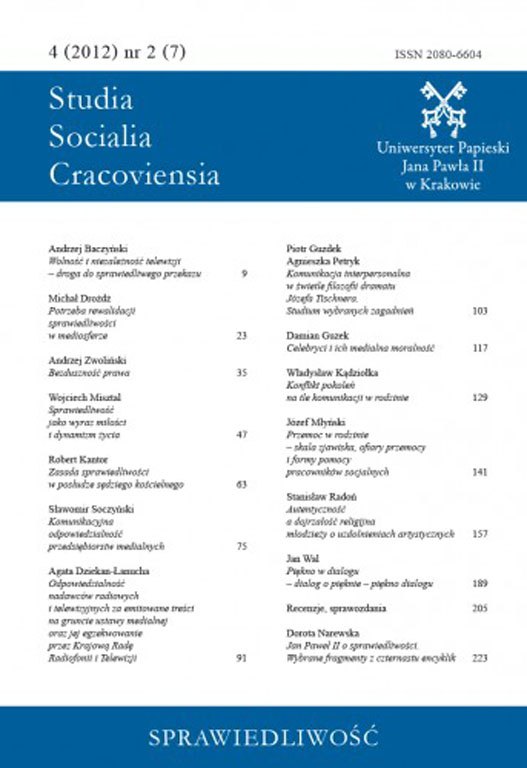Konflikt pokoleń na tle komunikacji w rodzinie
DOI:
https://doi.org/10.15633/ssc.415Słowa kluczowe:
komunikacja w rodzinie, konflikt pokoleń, komunikacja interpersonalnaAbstrakt
Autor artykułu próbuje pokazać podstawową rolę komunikacji interpersonalnej w rodzinie, zarówno w budowaniu więzi rodzinnych, jak i w przezwyciężaniu potencjalnych konfliktów. Autor uważa, że podstawowymi zasadami funkcjonowania każdej rodziny powinny być zgoda, miłość, odpowiedzialność, serdeczność i życzliwość, a w razie konfliktów bliska powinna być postawa skruchy i przebaczenia.Pobrania
Opublikowane
2012-12-31
Numer
Dział
Rozprawy, opracowania
Licencja
Prawa autorskie (c) 2012 Władysław Kądziołka

Praca jest udostępniana na licencji Creative Commons Attribution-NonCommercial-NoDerivatives 3.0 Unported License.
Autorzy publikujący w czasopiśmie udzielają jego wydawcy zgody o następującej treści:
- Autor zachowuje autorskie prawa majątkowe do utworu, a jednocześnie udziela wydawcy czasopisma zgody na jego pierwszą publikację w wersji drukowanej i wersji online na licencji Creative Commons Uznanie autorstwa 4.0 Międzynarodowe oraz zgody na wykonywanie opracowań, w tym przekładów.
- Autor ma możliwość udzielania zgody niewyłącznej na opublikowanie utworu w wersji, która ukazała się w czasopiśmie (np. zamieszczenia go w repozytorium instytucjonalnym lub opublikowania w książce), wraz z informacją o jego pierwszej publikacji w czasopiśmie.
- Autor może umieścić swój utwór online (np. w repozytorium instytucjonalnym lub na swojej stronie internetowej) jeszcze przed zgłoszeniem utworu do czasopisma.

